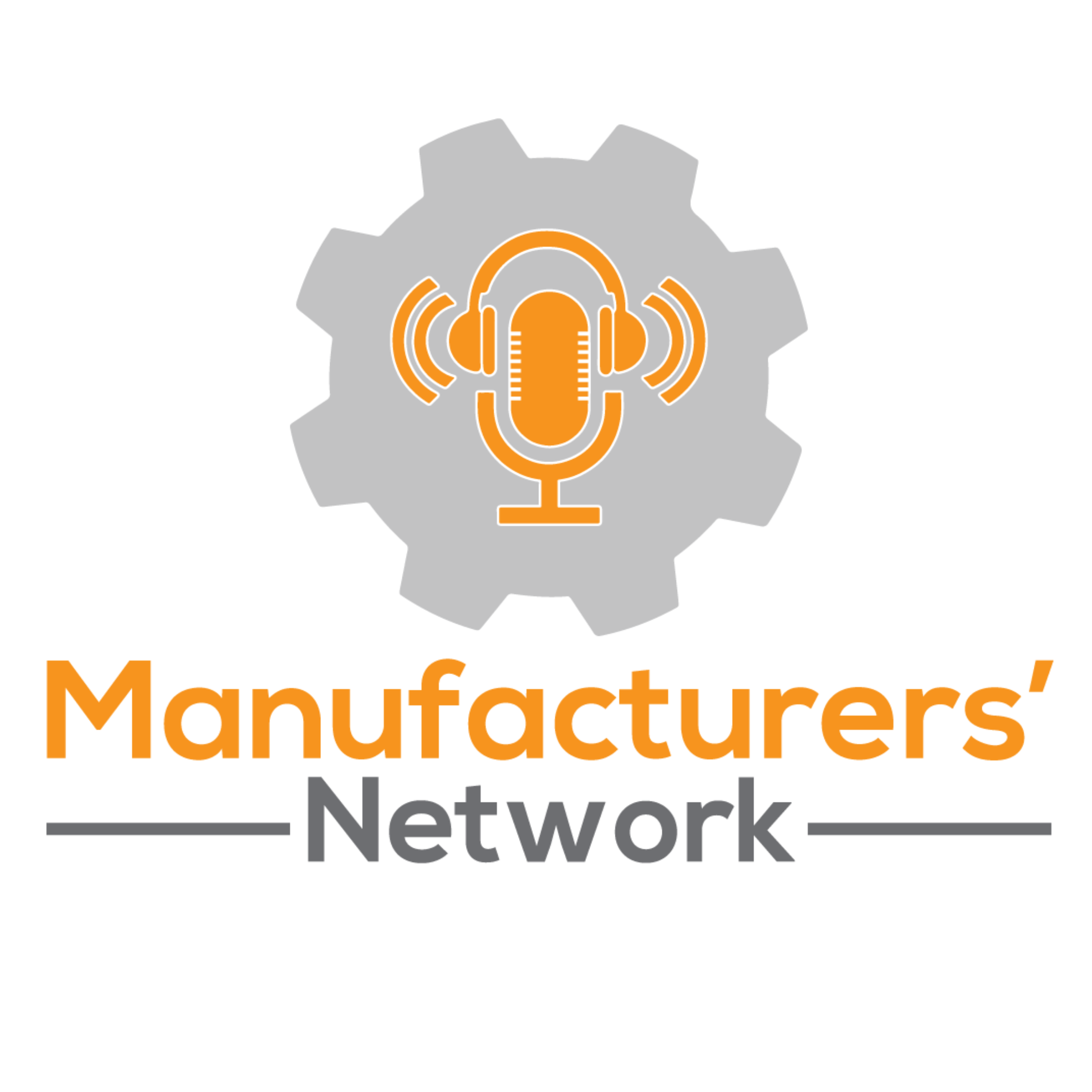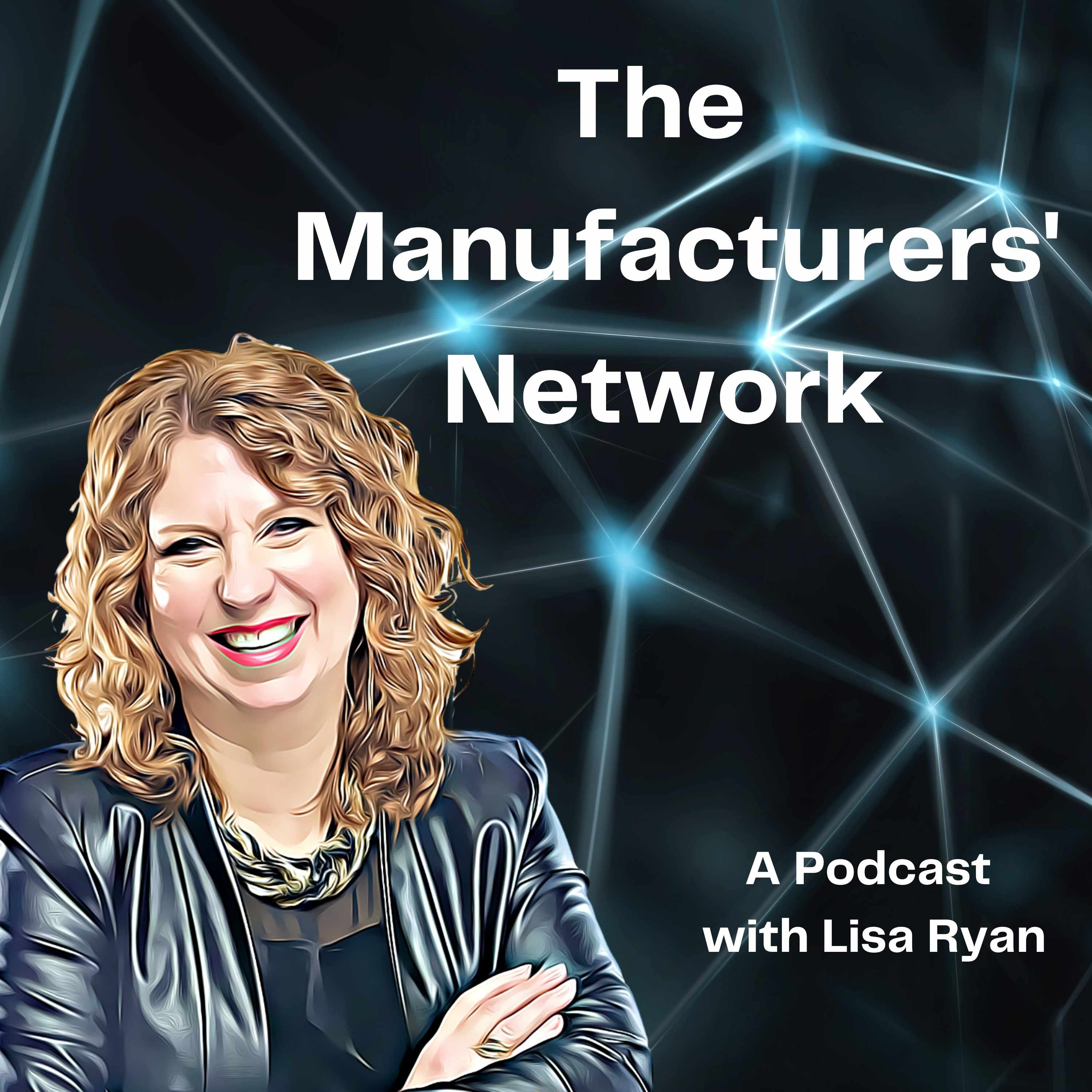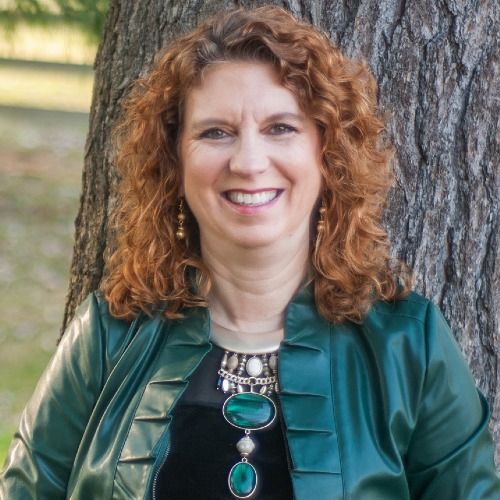Wellness - If You Build It, They Will Stay with Laura Timbrook
Connect with Laura Timbrook:
Email: Laura@LauraTimbrook.com
LinkedIn: https://www.linkedin.com/in/lauratimbrook/
Lisa Ryan: Hey, it's Lisa Ryan from the Manufacturers' Network podcast. I'm here with Laura Timbrook. Laura is a well-being strategist, and she's also a fellow podcaster. She is the host of the Manufacturing Wellness Podcast. So, Laura, welcome to the show.
Laura Timbrook: Awesome. Thank you so much for having me.
Lisa Ryan: We've had several conversations over the last couple of months. Not only was I on your podcast, but you were in my summit and focusing on why wellness is so essential to manufacturers. So before we get there, let's learn all about you. What led you to concentrate on wellness and then bring it into manufacturing as your point of focus?
Laura Timbrook: Yes. So for me, I come from a 15 year of management-level leadership background. I transitioned into corporate wellness coaching, and I did that for about another eight years. What I found out is that my favorite clients were manufacturers. So instead of focusing on all corporate and all industries, I managed down to manufacturing. And it's been such an adventure. I love when I leave a manufacturing facility and my cheeks hurt because I've been smiling and laughing all day.
And that was one reason I wanted to focus on their workforce because there was a lot of work to be done. Often, the employees felt like they were left out, that the wellness approaches didn't work for them in their unique lifestyle. I'm a big believer that health is for everybody. And I focused on manufacturing, and I love doing it.
Lisa Ryan: So share with us some of the reasons why wellness hasn't been a focus in manufacturing; and why is it even more important today?
Laura Timbrook: There hasn't been a focus in manufacturing because we take that approach like I'm tough enough. We don't realize how much our bodies start breaking down. When our bodies start breaking down, we power through it. And those who don't power through it, they're considered weak. That's not really how we need that to work. We need to make sure that we're building our employees up.
In the last two years, we have seen that wellness has come up in manufacturing, especially the small to mid-levels. Your big companies like G.E. and your large manufacturers, they've got those fancy wellness programs, but the small and midsize don't. And they're starting to realize now more than ever, especially with covid, how important taking care of our heart disease, diabetes, high blood pressure, how important that is. They decided through this whole pandemic, if you were going to get covid and how bad you were going to get it.
Lisa Ryan: Addressing that issue from a small and medium manufacturer is essential because I can't tell you how many of my clients that I've talked to that their employees get sick, they go to the emergency room. It's like they don't even think about they don't have a primary care physician. It hasn't been something that's been brought up at all in their careers. And when you look at some of the expenses that go along with that, if you can start with that foundational wellness and get employees in the habit. They're bringing those healthier habits home and knowing where they are from the point of wellness, instead of going and sitting for four hours in the emergency room, which is a pain, No. Two is going to cost that company a lot of money. And in the long run, it's not practical.
What are some of the foundational ways that you start or give manufacturers some of those ways to get started?
Laura Timbrook: We've all seen that iceberg picture where you have the top of the iceberg. That's your health fairs, your doctor's appointments, your fitness – that's the top of the iceberg. But the bottom of the iceberg is where wellness takes hold - that's with relationships and purpose. We forget how much those relationships affect our overall well-being. Think about having good relationships with your job and your family, how it makes you feel overall.
You're more likely that when you're sick, you're going to go to the doctor, you feel better about yourself. When you're in that happy state, what we want to do is we want to take a broad look at it. So the first thing we want to do is start with the employees. We want to make sure they have the health benefits that they need. We want to make sure they have health care to understand where they sit on their health.
What's your blood pressure? What's your weight? Have that understanding of where they need improvement. But then we need to start addressing everything else. Stress is a big one. And mostly we know that our top three stressors work is, number one, finances, and family. Those are our three top stressors. We have to address the workplace stress, you know, and that's been one of my most significant focus is now covid.
I can't get in to talk to the employees and help coach them. But what I can do at this point is to work with leadership to create a cohesive environment where our employees are supported. We want to make sure that they're taking time off, whether they're taking time off to relax or rest, or they're taking time off to go to their doctor appointments. Lisa, you made an excellent point. Many of our employees are not going to see their doctors when they're sick regularly; they're in the E.R. They're trudging through it. And we need to make sure that we are proactive in our health. We're seeing our doctors. We're seeing our dentist. We're seeing a cardiologist. Maybe we've been making times that they see a therapist because we know right now, you know, it's we're all feeling a little kind of so we want to make sure that we're taking care of that.
Lisa Ryan: When it comes to things like health fairs, because, again, I've heard this, we try to health care one to nobody came. So what is the process? Because, also, you're changing a whole way of people taking a look and maybe a lifetime of bad habits. That's certainly not going to change in one afternoon health fair. But what are some of the steps to get started? Also, are there some virtual options that you're seeing as far as those health care health fairs, too?
Laura Timbrook: Going back to why health fairs don't work, we often have a meager turnout. There are two main reasons for that. One is management buy-in. I will watch employees walk out of a health fair because who's not sitting in that health fair? So if you want your employees to be in that health fair, your CEOs, your leaders, your C suite executives all need to be in and attending those health fairs. And then the second is consistency.
If employees feel like you're checking a box off that says I get we offer health care, they're not going to take it seriously. You have to support your employees in understanding their health matters, not only to them and their family but to you as their employer. And once we feel supported, they're more likely to attend. The other key point of this is a lot of specialty manufacturing; employees are so afraid that if they attend a health fair and that data will be shared with their employer that they will not go to the health care.
So you have to make sure that you are communicating to your employees properly that their data is their data. They'reHIPPA rules still hold them we can't share. I can't share your weight or your health with your employer. I can't do it. So we need to understand that it's confidential, it's safe, and we care about you.
And going back to your question on the virtual' I'm doing virtual health coaching for employees. If we do a lot of virtual health biometrics where they can go to local doctors, local labs and get stuff done, they can meet with me for their results. One of the big things about the health fair is, not only do you want to give your employees the information on their biometrics, but you want to lead them down the path that they can make improvements.
Often at health fairs, they give you your blood pressure, give you all that, and then send you on your way. Whether it's a nurse, you need somebody to come in; it's a board-certified health coach, a nutritionist, a dietician, somebody that can help guide them to make those changes and do it practically. One of the big things I saw with manufacturing is that what worked in corporate didn't work with the manufacturing workforce.
The people you bring in have to make sure they understand the unique lifestyles of shiftwork of what they're going to be eating. Because let me tell you, corporate would go out to lunch at Baja Fresh. Manufacturing is packing lunches, and you have to let them know what to pack. That's cost-effective. There are so many different ways; first of all, you address the confidentiality issue, and that's a part of building that trust over time with your employees that can help them do that.
Lisa Ryan: But also translating the results. If somebody comes in and they say, and I'm making stuff up because I don't understand hard pressure, but if your heart pressure is one hundred and forty over 70 versus one hundred ninety over twenty-five, that's probably terrible up. But not knowing unless somebody says, oh, that's a little high or that's normal, that person may have no idea. Well, what is normal? What is for somebody that has primarily a sedentary job or they're not doing a whole lot, or they're making those repetitive motions?
So taking into effect what they're doing and giving them some strategies they can incorporate through the day. So why don't you share some happy stories, maybe some before and after hours of specific clients?
Laura Timbrook: One specific example always comes to mind when we talk about what they did. They had health events every single month. I have had the first time I was brought into this, there was this one woman and she drank a lot of Mountain Dew, like several cans of regular Mountain Dew a day. And she didn't work out, and she didn't care to make a single health change. She wanted nothing to do with it.
Fast forward, two years later, she is down to one Diet Mountain Dew a day. And this is huge for her. She's kickboxing four days a week. She lost weight. And you know what the most amazing thing out of all of this was? She was set to retire, and she didn't because she felt so good and she enjoyed her job, she said for the first time. And I think she was there for like 30 or 40 years.
She felt like her management cared about her. And she's like, what am I going to do? Sit home? I might as well come in here and have fun for her. It was fun. She enjoyed it. So it's such a broad change that we can make that affects everything from a person's single health to our entire organization. Imagine not having your employees wanting to leave. And not only that, but she brought her daughter in to work for the organization. So now you're attracting new generations.
We're aging out of our workforce. And when we talk about the millennial and Gen Z says they want wellness, family, and purpose are their top three. So if we are focusing on wellness in manufacturing and showing them purpose. We know jobs in manufacturing have a considerable purpose. Hey, we saw it with the whole tour toilet paper shortage, and people realize that there's a huge purpose to manufacturing. So we have the perfect scenario of attracting these younger generations coming in if we set ourselves up correctly.
Lisa Ryan: So what about from a cost standpoint? Because I know you can go the gamut when it comes to implementing programs into your facility. So without spending a gazillion dollars to bring in all the high tech equipment and stuff, what can a small or medium-sized manufacturer do that doesn't necessarily break the budget?
Laura Timbrook: The first thing you want to do is talk with your employees. What do they want? We can spend hundreds of thousands of dollars bringing in experts and fancy devices. But if your employees don't want that, why waste the money? So, have an understanding of what your employees want or what they feel like they need. The second thing is to talk to your insurance broker, find out about wellness dollars. This is key because there is money available in many of your health benefits that will pay for experts like me to come in, so it's no money out of your pocket.
Once you understand what your budget is, what your employees want, then that's when we start bringing in the health fairs. We want to bring in the health fairs because we need to understand that baseline. But a lot of times health fairs right off the bat, you're not going to have a large turnout. But we need to be consistent with them, letting them know, and then you can bring in experts like myself that will help coach your employees to make sustainable, healthy changes.
Often, we go way off the deep end and don't sustain with those diet plans. So we want something that's sustainable. But it's really about understanding your workforce, what they need and what you have available because especially for small to midsize, starting off with like your employee level gym isn't going to work out. But maybe you can team up with a local gym in the area that can offer benefits for them as well. Now, there you go.
Lisa Ryan: Let's take it back to Mountain Dew woman. She came in. She came in. She wanted nothing to do with it. She was close to retiring. She was not leading a healthy lifestyle, not working out, drinking all of that pop or soda, depending on what's part of the country you're in. So what was the first step to get her to buy in, to get someone like her to reconsider their view of wellness before that?
Laura Timbrook: So for her, it was seeing the numbers on a piece of paper and understanding where she was. She had pre diabetic numbers, and she had a family history of diabetes. So that was key when she had those numbers and seeing that in place and knowing that's an issue. But when I was coaching her, I asked her what would happen if you didn't make the health changes? Like, what, in five years, would your health look like?
And that picture scared her and not right away because she had to think about it a little bit. But then she thought about it. And we started with one simple health change, and maybe it was swapping out one of those waters for flavored seltzer water and making small changes. She often thought of exercising that she had to go into the gym and do all these things where she would be in a yoga class, not going to be in a yoga class. So she tried a bunch of classes and found out kickboxing was her thing.
You want small, sustainable steps. You don't want to take all her soda right off the table right away because that's not sustainable. She will never last but small changes. And that's what happens when we talk about it from an individual standpoint. But the more significant thing for her was knowing that her employer was supporting her and every month having myself or somebody else come in and, you know, continue that conversation with her.
Lisa Ryan: Laura, I know that you do lots of services for manufacturers in the wellness area, so you're a little bit about how you work with your clients and what's the best way to get in touch with you.
Laura Timbrook: We work on a couple of different approaches. We can work on the individual approach, which addresses employee health fairs, working with those employees one on one or in a group format. Then we can work with leadership, having leadership understand that work-life, harmony, and how they can integrate wellness as part of a leadership approach. Then, of course, we have the larger organization where everybody is on the same page and start implementing that wellness culture.
That's when we're dealing with that holistic thing. You want that wellness spread across your entire organization, but you're not going to start there. You're going to start in baby steps. So the simplest way to get a hold of me is to go to LauraTimbrook.com and my podcast information is on there. You can get in touch with me. We can have a conversation about how to start strategizing your employee wellness approach.
Lisa Ryan: Laura, it has been an absolute pleasure to have you on the show, so thanks for being here. I thank you so much for having me. You're very welcome. I'm Lisa Ryan, and this is the Manufacturers Network podcast. We'll see you next time.


